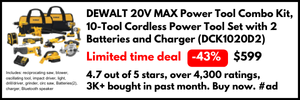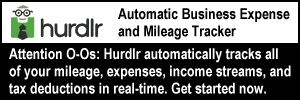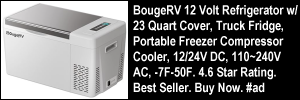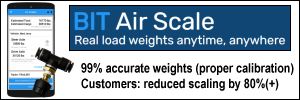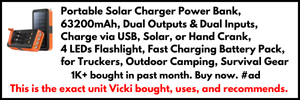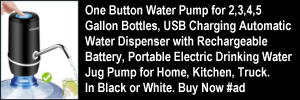If you’re new to budget planning, we will show you the basics you need to know before using money management software.
As we explained on our budgeting page, there are many similarities between trucking and budgeting.
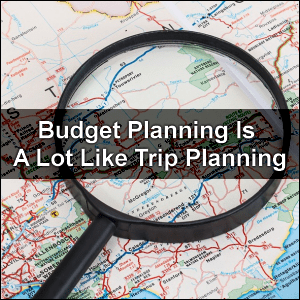 In trucking, you are expected to know:
In trucking, you are expected to know:
- where you have been (previous loads and customers, history, good and bad experiences);
- where you are (shipper);
- where you are going (consignee or receiver); and
- how you will get there (route and responsibilities).
When budgeting, you need to know:
- where you have been (including your personal spending style and what about that you want to change);
- where you are (having current and accurate balances for all your accounts);
- where you’re going (including having lists of your income sources, fixed expenses, variable expenses and financial goals); and
- how you will get there (the plan by which you will achieve your financial goals).
It is truly unfortunate that some truck drivers live from paycheck to paycheck.
They spend what they make, having no budget planning process in place and certainly never planning for a “rainy day.”
The concept of using money management software is about as foreign to them as the man in the moon. But since you’re reading this page, we know that you desire more.
Budget Planning Involves Understanding Your Personal Spending Style
 You can help yourself significantly if you understand your personal spending style.
You can help yourself significantly if you understand your personal spending style.
If you’re married, it’s a good idea to know your spouse’s spending style, too.
Generally, there are two types of people: spenders and savers.
In some spender-saver marriages, there is tension and stress over money management.
But there can be harmony.
One of the ways that you can determine your personal spending style is to answer the question, “If I had an extra $100, what would I do with it?”
Would you spend it or save it?
If you would spend it, what would you spend it on?
While your answer may differ, here are some potential answers that may determine your priorities:
- paying bills (which may indicate that you are behind on making payments, your “unwritten” budget is out of whack, or something unexpected came up);
- buying something for the house (which may be a long-term goal, or may indicate that you have neglected home maintenance for too long);
- buying something necessary and tangible (perhaps personal or for a family member); or
- splurging on a one-time expense (like a meal out at a really fancy restaurant).
Once you determine your spending style, determine what you would like to change about that.
If you find that you splurge too much, perhaps having a financial accountability partner can help.
If you’re comfortable with it, your spouse can be your accountability partner; however, having someone outside your family and of the same gender can provide more objectivity.
Budget Planning Requires Listing All Your Income
Income falls into two categories: fixed and variable.
If you drive anything other than a dedicated route where your miles are fixed every month — or if you have a local truck driving job with hourly pay based on fairly consistent hours — you most likely have a variable income.
While we advise a budget for everyone, engaging in the budget planning process is even more important for variable income households than fixed income households because you need to set aside money for fixed and unplanned for expenses.
The main source of income for many truckers is from their jobs.
So, look at your settlement sheets for the last year. Sort them by date. Write down either on paper or in a spreadsheet the number of miles and your paycheck amount for each check in consecutive order.
Your miles may vary based on the type of freight you haul, the season, or any number of other factors.
If your situation is like that of many other professional drivers, your miles have been down since the economic downturn began.
For your convenience, we have designed a yearly mileage tracker (available through our free downloads page) for you to write down the number of miles you run and your paycheck each week.
In addition to pay from your job, write down income from all other sources, including stocks, bonds, mutual funds, interest, annuities, etc.
Budget Planning Requires Listing All Your Expenses
 Then, in like manner, write down all of your fixed and variable expenses.
Then, in like manner, write down all of your fixed and variable expenses.
You’ll find that many of these expenses fall in certain categories.
Many drivers have their taxes (federal, state and Social Security) and insurance (medical, dental and vision) deducted from their paychecks.
If so, you don’t need to write those down in your budget because you don’t need to calculate those in (as they’ve already been calculated in).
Major budget categories for many people include:
- Taxes;
- Tithe (for those who give to the church);
- Housing:
- mortgage or rent;
- property taxes;
- property insurance;
- maintenance & repairs;
- Utilities:
- electricity;
- gas;
- water;
- land line telephone;
- Internet, mobile broadband and/or cable;
- cell phone;
- Food;
- Automobile/vehicle:
- gas and oil;
- tires;
- maintenance & repairs;
- Insurance:
- life;
- health;
- auto;
- legal;
- Child care & Education;
- Entertainment & Recreation;
- restaurant meals and tips;
- movies (in-theater, rented, purchased, downloaded);
- music;
- satellite radio;
- Clothing (unless your company provides a clothing allowance that pays all);
- Health-related (besides that which you pay for insurance):
- medical;
- dental;
- vision;
- prescriptions and vitamins;
- Debt repayment (including credit card balances);
- Savings; and
- Miscellaneous:
- computer;
- personal / hobbies;
- political;
- subscriptions.
For your convenience, we have designed a beginner budget (available through our free downloads page) for you to write down this information.
Budget Planning Category Conflict
If you find a place where an expense can go in two categories — such as a Sirius XM radio subscription that could be placed under
- either Entertainment & Recreation (satellite radio)
- or Miscellaneous (subscriptions)
— choose the category that makes the most sense to you. Just keep it consistent every month, perhaps making a “Comment” in your own spreadsheet to keep you on track.
In our own personal budget spreadsheet, Vicki lists Mike’s trucking expenses separately. During the time he drove regionally, she listed under the “Truck and related supplies/services” category these expenses:
- Ice,
- Food in Truck,
- Restaurant Meals, and
- Tips.
Update
When Mike began driving locally, Vicki began packing him lunch and a gallon of ice water every day.
His only other food expenses were snacks and drinks he purchased during the course of a work day.
Even these, she tries to help him minimize by packing snacks for him.
We revised our budget so that food bought during the work day are sub-categorized under “Restaurant” under the main category of “Food.”
Budget Planning Guidelines
There are some general guidelines on maximum percentages for each category.
For example, a rule of thumb is to spend no more than 36 percent of your disposable income for Housing (all categories).
You will need to determine what works best for you.
Some households (like ours) may put more money in the Miscellaneous category under the “computer” subcategory (since we have a variety of computer programs including anti-virus/spyware protection with annual subscriptions).
Budget Planning Flexibility
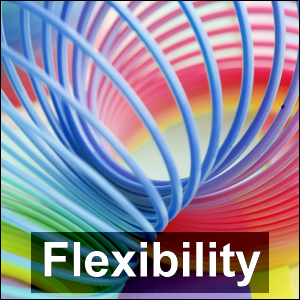 We practice limited flexibility in our personal budget.
We practice limited flexibility in our personal budget.
Our budget planning process includes checking to see if
- categories need to be added or removed,
- amounts in those categories need to be adjusted, or
- budgeted monies need to be reallocated to a different category.
Here are two living examples of our own budget planning flexibility.
- The price of gas has come down from its high of over $4 per gallon. Therefore, for the category “Automobile: gas and oil” in our budget:
- we can lower the amount of money in that category, or
- take the money that didn’t get spent from that category one month and reallocate it toward another purchase.
- When we bought a new printer and ink jet cartridges, we could either allow the amount in our “Miscellaneous: computer” category take care of it (realizing it would take months for that category to lose its negative amount), or reallocate monies from other categories to pay it off.Since we had excess money in the Automobile category, we reallocated money from that category to help cover the cost of the printer and supplies.
Problems With Reallocations
We feel compelled, however, to share one word of warning about reallocating money in your budget planning process:
If you find yourself reallocating money from category to category too much, please adjust your budget.
Keep in mind the financial goals you have set and adjust your spending where necessary.
Money Management Software
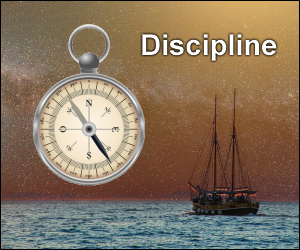 There are many types of software programs — and even some online services available — for budget planning, personal finances and money management.
There are many types of software programs — and even some online services available — for budget planning, personal finances and money management.
While most of them cost money, there are some free money management services available.
If you’re new to this, you may not know which features would best meet your needs, so do some research.
For example, many people pay bills and do their banking online these days.
If this is something you can and want to do, look for money management software that will allow you to set this up.
According to personal finance software reviews we’ve seen online(1), the three top-rated programs are:
- Quicken,
- Microsoft Money, and
- Moneydance.
When Microsoft Money issued a report that they would no longer provide online updates, we switched to Quicken Deluxe 2010 (now way out of date). Note: We’ve never used Moneydance.
Mike may have upgraded once since then. However, he has done some research on newer versions of Quicken and they just don’t seem to work as well as they should.
One feature that is handy is the ability to export financial information from our financial software directly into tax management software like Turbo Tax.
If you are an owner-operator, a different software package that allows you to compute information based on your loads might work better for you.
Note: If you are an owner-operator, you will have two different budget planning set-ups: personal and business. Make sure you keep them separate for tax purposes.
Also, there are some Smartphone apps designed to help you manage your money.
![]() Money saving tip: You don’t have to have a money management software program or use an online service to keep track of your budget.
Money saving tip: You don’t have to have a money management software program or use an online service to keep track of your budget.
For years before computers, Vicki’s mom wrote out their family’s expenses on the backs of long envelopes.
Using a spreadsheet makes things easier, which is why we’ve designed and made the “beginner budget” spreadsheet available to you.
We wish you great success in your budget planning.
Return from Budget Planning and Money Management Software to our Budgeting page or our Truck Drivers Money Saving Tips home page.
References:
1. personal-finance-software-review.toptenreviews.com/ (no longer online)




